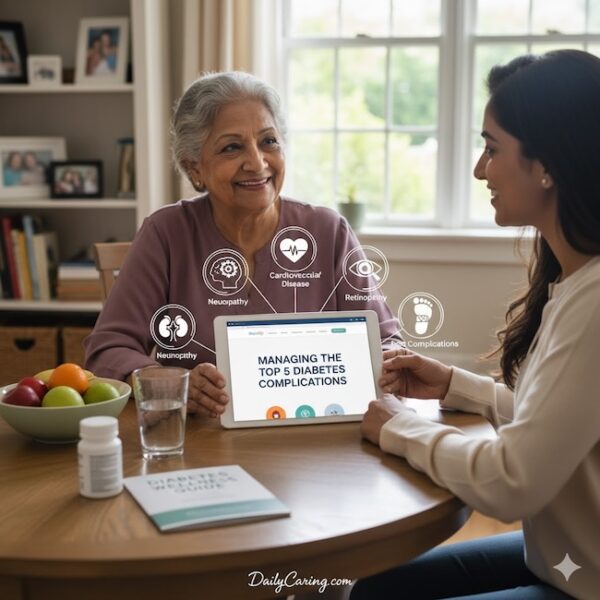Managing diabetes often means focusing on numbers: Blood sugar readings, carbohydrate counts, and medication dosages. But it’s what those numbers represent over the long term that holds the key to preventing serious health issues.
Unmanaged diabetes can quietly affect nearly every system in the body, leading to complications that threaten independence and quality of life. The good news is that understanding these risks is the first and most powerful step toward preventing them.

Let’s shed light on five common diabetes complications, not to frighten you, but to empower you with the knowledge needed to protect your loved one’s health for years to come.
Diabetes is Linked to Many Serious Health Issues
Nearly 30% of Americans aged 65+ have diabetes – more than 1 in 4 older adults.
And complications of diabetes put seniors at even higher risk of developing other severe medical conditions.
Five common health conditions occur at a much higher rate among seniors with diabetes.
They include Alzheimer’s disease, heart disease, and an increased risk of falls.
Early detection and treatment of these severe health conditions improve disease management and quality of life.
When you know which symptoms to watch for, you’re more likely to catch these diabetes complications before they become severe.
We explain what diabetes is, why it can lead to additional health problems, and how to spot the five most common complications.
What is Diabetes?
When someone has diabetes, their blood glucose (blood sugar) is too high.
This can happen when the body doesn’t make enough insulin. Insulin is what moves glucose from the blood into cells.
When there isn’t enough insulin, glucose doesn’t get moved into the cells. Instead, it builds up in the blood, leading to high blood sugar.
Untreated diabetes causes symptoms like extreme thirst or hunger, frequent need to urinate, and fatigue.
Why Does Diabetes Cause so Many Other Health Complications?
Over time, high blood sugar can seriously damage the eyes, kidneys, nerves, heart, gums, teeth, and blood vessels.
This leads to health conditions like heart disease, stroke, blindness, kidney disease, nerve problems, gum infections, and amputation.
People with diabetes are also more likely to have heart disease or a stroke, and at an earlier age.
VIDEO: Top 5 Diabetes Complications to Watch Out For
The Top 5 Health Conditions that Relate Directly to Diabetes
1. Heart disease
Heart diseases are more likely to occur in seniors with diabetes.
To find out about symptoms to watch for, ask your older adult’s doctor which type of heart disease they’d be more likely to develop based on their overall health.
Once you know which heart disease your loved one could potentially develop, you’ll be able to ask the doctor about symptoms to watch out for.
And if you spot any of those signs, you’ll know to contact the doctor right away.
2. Alzheimer’s and dementia
Alzheimer’s disease and dementia are twice as likely to occur in patients with diabetes.
If you notice unusual behavior, persistent memory or cognitive problems, have an aging loved one visit their doctor for a full evaluation as soon as possible.
Early diagnosis and proper treatment will improve quality of life.
3. Falls and fractures
Diabetes and related conditions like gout can make getting around more difficult. That increases an older adult’s risk of falls and fractures.
Prevent falls by asking their doctor to evaluate a senior’s fall risk regularly and by making their home as fall-proof as possible.
4. Multiple medications
Diabetic seniors often take six or more prescription medications.
Because so many medicines are being used at the same time, an older adult will be at higher risk for negative side effects and drug interactions.
Immediately report any adverse side effects and regularly ask their doctor to do a comprehensive review of all medications and supplements.
5. Additional health complications of diabetes
Depression, vision or hearing impairments, and incontinence are additional medical conditions that are more likely to occur in people who have diabetes.
Be aware that these conditions may be related to diabetes. If you notice symptoms of any of these conditions, have your loved one visit the doctor right away.
Final Thoughts About Diabetes and Associated Medical Issues
Awareness of these potential complications is not a prediction of the future, but a roadmap for prevention. Each healthy meal, every bit of physical activity, and all consistent medication management actively builds a defense against these risks.
Your vigilant role as a caregiver in supporting these daily habits is invaluable. Remember, you are not just helping to manage a condition; you are actively safeguarding your loved one’s vision, nerve health, heart function, and overall independence.
Let this knowledge fuel your commitment to a proactive care plan, and celebrate every positive step you take together on this journey.
Recommended for you:
- 10 Common Chronic Diseases in Seniors: How to Prevent and Manage
- 10 Ways to Improve Health in Seniors Living with High Blood Pressure
- Why Seniors Need a Health Advocate: 7 Health Benefits
About the Author

Connie is the founder of DailyCaring.com and was a hands-on caregiver for her grandmother for 20 years. (Grandma made it to 101 years old!) She knows how challenging, overwhelming, and all-consuming caring for an older adult can be. She also understands the importance of support, especially in the form of practical solutions, valuable resources, and self-care tips.














check your blood pressure at least 4 times a week at different times and whrit the results
It’s a great idea to monitor and keep notes about blood pressure to see if it remains stable or notice if it starts to rise.